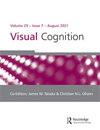Verbal instructions as selection bias that modulates visual selection
IF 1.7
4区 心理学
Q3 PSYCHOLOGY, EXPERIMENTAL
引用次数: 0
Abstract
ABSTRACT Research has shown that in addition to top-down and bottom-up processes, biases produced by the repetition priming effect and reward play a major role in visual selection. Action control research argues that bidirectional effect-response associations underlie the repetition priming effect and that such associations are also achievable through verbal instructions. This study evaluated whether verbally induced effect-response instructions bias visual selective attention in a visual search task in which these instructions were irrelevant. In two online experiments (Exp.1, N = 100; Exp. 2, N = 100), participants memorized specific verbal instructions before completing speeded visual-search classification tasks. In critical trials of the visual search task, a priming stimulus specified in the verbal instructions matched the target stimulus (positive priming). In addition, the design of Experiment 2 accounted for the repetition priming effect caused by frequent appearance of the target object. Reaction time analysis showed that verbal instructions inhibited visual search. Response error analysis showed that verbal effect-response formed an effect-response association between verbally specified stimulus and response. The results also showed that the target object’s frequent appearance strongly affected visual search. The overall findings showed that verbal instructions extended the list of selection biases that modulate visual selective attention.言语指令作为调节视觉选择的选择偏见
摘要研究表明,除了自上而下和自下而上的过程外,重复启动效应和奖励产生的偏见在视觉选择中也起着重要作用。动作控制研究认为,双向效应-反应关联是重复启动效应的基础,这种关联也可以通过言语指令实现。本研究评估了在视觉搜索任务中,言语诱导效应反应指令是否会偏向视觉选择性注意,而这些指令与视觉选择性注意无关。在两个在线实验中(实验1,N = 100;实验2,N = 100),参与者在完成快速视觉搜索分类任务之前记住特定的口头指令。在视觉搜索任务的关键试验中,言语指令中指定的启动刺激与目标刺激相匹配(阳性启动)。此外,实验2的设计考虑了目标物体频繁出现引起的重复启动效应。反应时间分析表明,言语指令抑制视觉搜索。反应误差分析表明,言语效果反应在言语指定刺激和反应之间形成了效果-反应关联。结果还表明,目标物体的频繁出现强烈影响了视觉搜索。总体研究结果表明,言语指令扩展了调节视觉选择性注意的选择偏见列表。
本文章由计算机程序翻译,如有差异,请以英文原文为准。
求助全文
约1分钟内获得全文
求助全文
来源期刊

VISUAL COGNITION
PSYCHOLOGY, EXPERIMENTAL-
CiteScore
4.20
自引率
10.00%
发文量
29
期刊介绍:
Visual Cognition publishes new empirical research that increases theoretical understanding of human visual cognition. Studies may be concerned with any aspect of visual cognition such as object, face, and scene recognition; visual attention and search; short-term and long-term visual memory; visual word recognition and reading; eye movement control and active vision; and visual imagery. The journal is devoted to research at the interface of visual perception and cognition and does not typically publish papers in areas of perception or psychophysics that are covered by the many publication outlets for those topics.
 求助内容:
求助内容: 应助结果提醒方式:
应助结果提醒方式:


